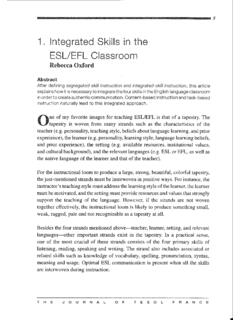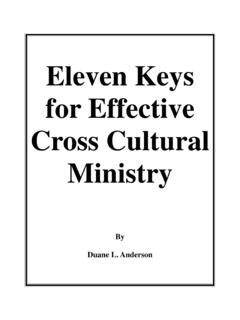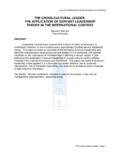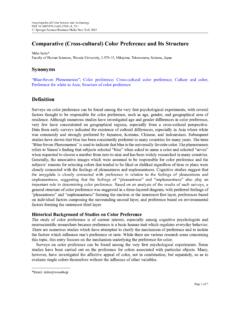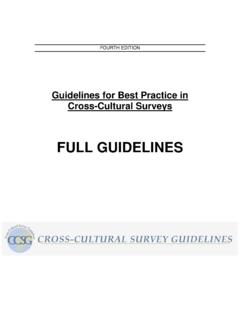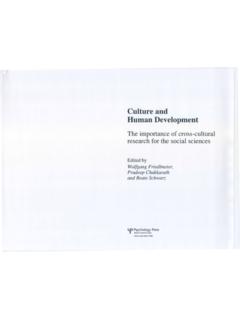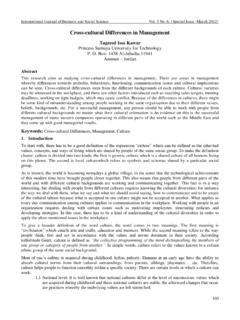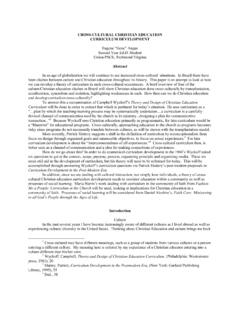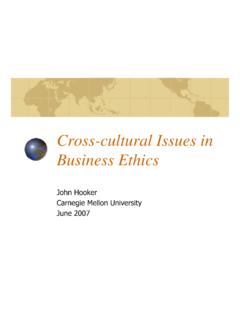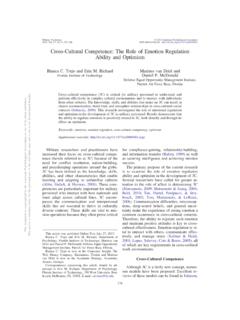Transcription of Cultural, Multicultural, Cross-cultural, Intercultural: …
1 TESOL-France , multicultural , cross - cultural , Intercultural: A Moderator s ProposalSusan FriesAbstractThis article is an attempt to cover some of the issues of terminology, philosophy andpolitics at the point where language teaching and culture meet and sometimes collide. Itis intended for English teachers who have not had much contact with the field ofintercultural communication, except perhaps what they have seen in recent EFL coursebooks. Nevertheless, many of these teachers have had some personal experience offunctioning in more than one culture, for example as an EFL teacher in a foreign country,or of dealing with students from cultures other than theirs.
2 This is the case in almostevery EFL classroom nowadays: even French native speakers teaching English in Frenchschools have have students of foreign origin or of mixed article was inspired by promotional material that was sent out before the 2002 TESOL-France Colloquium, which posed some provocative questions around theconference topic, itself presented as a question : A cross - cultural Approach to theTeaching and Learning of English ? I was asked to be moderator of the opening roundtable discussion since some of thecolloquium organizers knew I was interested in intercultural communication and hadbeen teaching it for several years.
3 The roundtable included four of the distinguishedcolloquium speakers, and showed how different their perspectives and areas of interestwere on this question. Members of the Paris audience asked questions and madecomments, broadening the topic even further in a spirited and very subjective debateabout choosing the appropriate variety of English, accent and culture to teach in preparing for the round table I had vowed to remember that the discussion was notabout my personal opinions. As it turned out it most definitely was not, since it rapidlydeveloped a life of its own, over which I felt I had very little control.
4 This article mightbe considered as my turn, my way of entering the debate, which is why I ve called it AModerator s Proposal . (Since my title is a play on words and a cultural reference, youmight say it is a paradoxical choice for an article which is not at all ironic, and in which Ihope to be inclusive.)I am writing as an American who has lived in France for more than twenty years and is now adual national. I studied French at school and in college, and now teach English at a French grande cole . For the past ten years, the theme of some of my classes has been InterculturalCultural, multicultural , cross - cultural , intercultural : A Moderator s Proposal page2 TESOL-France , part of a content-based approach to language teaching.
5 In addition, mydoctoral research in linguistics deals with the intercultural aspect of foreign accents : cross - or inter-?In French the only possible adjective for this field is interculturel , whereas in Englishwe have both intercultural and cross - cultural . Many English speakers favor cross - cultural , some almost avoiding intercultural as if it were a case of vocabularyinterference with French. Others use the terms have entitled my class intercultural Communication , because like many peopleinvolved in this field, I distinguish between these two terms.
6 In our usage, cross - cultural applies to something which covers more than one culture. For example a cross -culturalstudy of education in Western Europe would be a comparison of chosen aspects ofeducation in various countries or regions, but would consider each country or regionseparately and would not suggest any interaction between the various educational the other hand, the term intercultural implies interaction. From an interculturalperspective, it would be possible to study the experiences of students or teachers who movefrom one educational system to another, or to examine the interactions of students fromdifferent countries enrolled in a specific class or program.
7 Culture shock and culturaladaptation are thus intercultural notions. An intercultural approach to language teaching I would like to propose that taking an intercultural approach to language teaching does notmean teaching culture , be it from an anecdotal point of view (Beefeaters, double-deckerbuses, cream teas) or from a political and current events point of view (crime, gun control,the death penalty).An intercultural approach also goes beyond lists of Dos and Don ts and does not purportto give students tricks or recipes they can apply whenever they communicate with peoplefrom a given culture.
8 Far from the cultural imperialism mentioned in one of theprovocative questions from the 2002 colloquium literature, an intercultural approach shouldenable learners of English to treat other speakers of English, native or non-native , withcuriosity and of cultureThe word culture has many definitions, so it seems important to rule out those that arenot pertinent in the context of intercultural , multicultural , cross - cultural , intercultural : A Moderator s Proposal page3 TESOL-France example, Latin scholars might emphasize the agricultural roots of the term, which arestill apparent in French ( la culture du ma s ); in English we still speak of a culture ofcells in a Petri dish.
9 Nevertheless the definition of culture that is uppermost in manypeople s minds is that of high culture , as in the man ain t got no culture . Likewise wespeak of someone as cultured or cultivated , or of the cultural events scheduled in acertain town on a given weekend. None of these definitions apply in the field ofintercultural research, which defines culture from a more anthropological Bennett, an American interculturalist and the founder (with his wife Janet) of theIntercultural Communication Institute in Portland, Oregon, gave this definition in a seminarI attended: the learned and shared values, beliefs and behaviors of a group of interactingpeople.
10 Some of the words in this definition bear and cultureIt is crucial to remember that culture is learned, not something in one s blood . Childrenadopted as infants will have the culture of their adoptive parents and their society, althoughwe can t totally discount the impact of their very first experiences, even those in the womb(for example, the sound of their birth mother s voice!). And of course an Asian childadopted by non-Asian parents in Europe, to take one example, will have to explain anddeal with the difference between his true culture (say, German or French) and the culturethat outsiders may expect him to have, based on his culture is learned through interaction, and shared by the people interacting.
